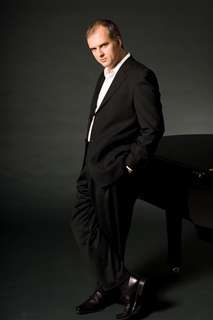|
Back
Romantic Staples and a Mammoth Rarity Washington
The Kennedy Center
02/07/2019 - & February 9, 2019
Johannes Brahms: Tragic Overture in D minor, Op. 81
Robert Schumann: Piano Concerto in A minor, Op. 54
Franz Liszt: A Faust Symphony
Nicholas Angelich (piano)
The National Symphony Orchestra, Gianandrea Noseda (conductor)

N. Angelich (© Stéphane de Bourgies)
Thursday night brought an ambitious program at the NSO, dominated by a warhorse of a Romantic piano concerto and a Lisztian curiosity of epic proportions. As a curtain-opener, Gianandrea Noseda led a characteristically well-shaped Brahms Tragic Overture. He set a somewhat slower basic tempo than one might have expected—more non troppo than allegro—and this lent the rendition an effective sense of weight and seriousness of purpose. Orchestral tuttis in the Overture’s outer sections were big-boned and sweeping. Woodwind solos seemed to me somewhat under-characterized, and ideally I prefer for Brahms a somewhat wider color palette than the NSO brought to the table, but on the whole this was a compelling reading of a work that does not always seem to catch fire.
Nicholas Angelich, the soloist in Schumann’s Piano Concerto, placed less emphasis on an even, smooth tone than Trifonov generally did in his NSO appearance last week, yet his performance was none the worse for that. Indeed, his playing was highly robust and communicative, often reflecting a very appealing “speaking” quality. But there was no lack of musicality and warmth in more reflective passages; Angelich brought a real expressive variety to his playing. There was much to admire in the accompaniment as well, especially in the finale. This was not so much a matter of the NSO taking its time to warm up as of the rather uningratiating nature of the busy orchestral writing in much of the first movement—one place where Schumann’s reputation for muddy orchestration seems merited.
The concert concluded with the NSO’s first performance of Liszt’s A Faust Symphony since 1942, and with the exception of the odd transient rough patch, the polish and assurance of the playing belied the ensemble’s lack of prior experience with the score. The work’s seven-decade absence from NSO programs reflects its frequent dismissal as a piece of overblown kitsch. There is at least a grain of truth to this; it is certainly heavier on visceral impact than melodic inspiration and tends toward the episodic. And unlike Liszt’s relatively popular tone poems, this (really an extended tone poem despite its title) lasts a whole hour. There is nonetheless a good deal to enjoy here, even if the work goes on longer than it should. In spite of the title, this is not a narrative representation of Goethe’s Faust but rather a series of more or less impressionistic character studies inspired by it: Faust in the first movement, Gretchen in the second, and Mephistopheles in the third. Faust is represented by a lot of rather slithery chromatic music, reminding me more of Franck than Wagner (whose Lohengrin Liszt had premiered four years before composing A Faust Symphony); Gretchen’s music is more lyrical, and the second movement alternates between chamber music for various combinations of strings and winds and longer full-ensemble sections. (Mephistopheles’ movement is largely built upon material from the first movement.) Even if there is a dearth of memorable melodic material, much of the more lyrical music nonetheless retains a certain charm, and one can appreciate the dramatic effects throughout the piece even when they do not represent the last word in subtlety.
Certainly Noseda treated this like serious concert music rather than kitsch, shaping phrases gracefully yet firmly and not stinting on drama where appropriate. His sure grasp of the work’s overall structure was especially evident from his natural transitions, not a given in such an episodic work. In short, Noseda and his orchestra brought off a sprawling and problematic piece with an impressive and somewhat rare combination of conviction and musicality—the highlight of an already engaging and satisfying evening of music.
Samuel Wigutow
|